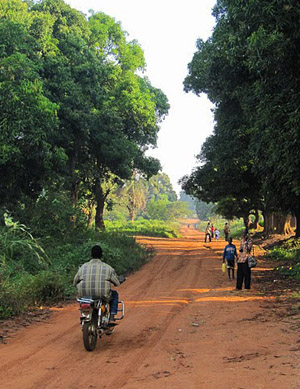
As Enough’s field researcher in southern Sudan, my main job is to conduct research on the evolving political situation and distill it into analysis that can be used when my Enough colleagues in Washington do advocacy on Capitol Hill or make policy recommendations to the Obama administration. However, I also like to impart stories about everyday life in Sudan, since elections, violence, and political agreements are just some of the elements of the reality of life for southern Sudanese people and for foreigners like me living in the country. Here is a short article I wrote about my motorcycle taxi driver Patrick. This article appeared this week in the Guardian Weekly:
During yet another blisteringly hot afternoon in Juba, the capital of southern Sudan, Patrick and I were bumping along on one of Juba’s potholed roads on his motorcycle taxi. As a lone researcher working for a small Washington-based organisation, I can’t afford a car, but on the back of Patrick’s boda (as motorbikes are known here) I have enjoyed getting to know Patrick and experiencing Juba up close.
As we drove, Patrick told me over his shoulder that his village of ¬Tambura – near southern Sudan’s border with the Central African Republic – “just got network”. In other words, Patrick’s village now has a mobile-phone tower.
Patrick was separated from his ¬parents during Sudan’s 23-year civil war and spent some of his childhood in a refugee camp in northern Uganda. He has not been back to his village for nine years. So for him, the news from Tambura was more than just a sign of development or, in the political science-speak I use as a researcher, of “infrastructure extending to the rural periphery”. It has enabled Patrick to hear his parents’ voices for the first time in almost a decade. He said that both of his parents cried when they heard him.
If I spend too much time speaking with UN officials or socialising with aid worker friends, I can start to think I’m getting a handle on the “situation” in southern Sudan. I know the humanitarian statistics, I know the names of the key politicians and I can rattle off a forecast on the future of southern Sudan after its self-determination referendum set for January 2011.
But then I have a conversation with someone like Patrick and I realise that I have absolutely no idea. I cannot ¬imagine what it would be like not to speak to my parents for nine years. I cannot imagine what it would be like to have to run from war as a child and to fear a return to war again as an adult. I cannot even imagine what it would be like to drive a motorcycle around hot and dusty Juba all day, because I can take shelter in my air-conditioned apartment inside a fortified compound.
The nonchalant way in which Patrick brought up the incredible news of his reconnection to his parents made me wonder about all the other twists and turns of his life. It will take many more boda rides to hear more of his stories, but I am grateful that he shared this happy one with me.

